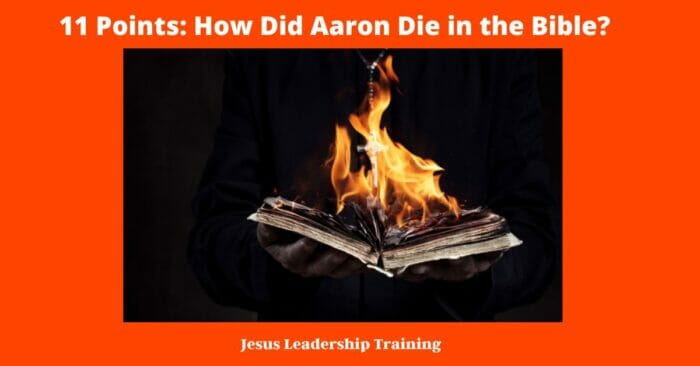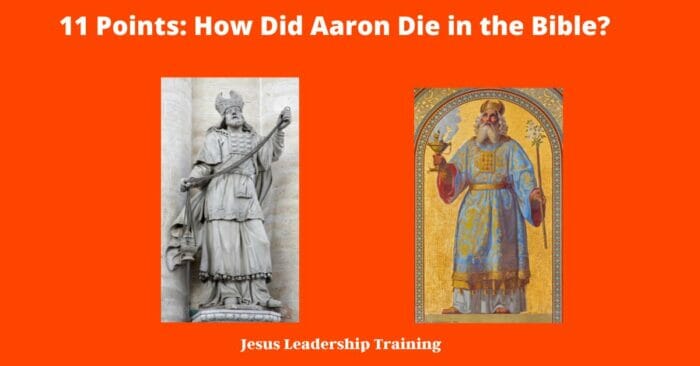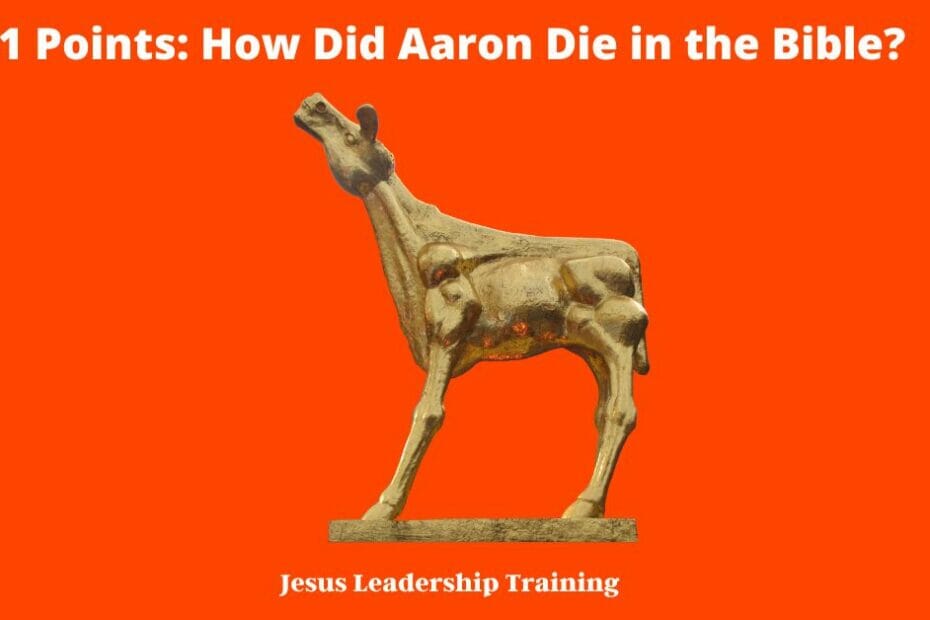How Did Aaron Die in the Bible – Aaron was an important figure in the Bible, but his death is a little less known. How did Aaron die in the Bible? Many people assume that he died when Israel entered the Promised Land, but that’s not actually what happened. In this blog post, we will explore Aaron’s death and what caused it. We will also take a look at the golden calf incident and see how it played into his death. Stay tuned for more!
Table of Contents
How Did Aaron Die in the Bible
Aaron’s death is described in two different ways in the Torah. The first account, found in Numbers, states that Aaron died on Mount Hor after he was stripped of his priestly garments by Moses and given to Eleazar. The second account, found in Deuteronomy, states that Aaron died when he approached the land of Canaan and was not allowed to enter because he had shown impatience at Meribah.
Aarons Death in the Bible (Version Old Testament / Torah
Aaron, the brother of Moses, played a key role in the Exodus story. As the High Priest of Israel, he was responsible for leading the people in worship and for caring for the Ark of the Covenant. He also stood with Moses as he confronted Pharaoh and led the people out of slavery
. Aaron’s death is recorded in Numbers 20:23-29. After the people complained about the lack of water, in the waters of Meribah, God instructed Moses to speak to a rock, and water would flow from it. But in his frustration with the people, Moses struck the rock twice. Because of this act of disobedience, God told Aaron that he would not be allowed to enter the Promised Land. Instead, he would die in the wilderness. Aaron died on Mount Hor, the top of the mountain, top of Mount Hor at the age of 123. His son Eleazar took over as High Priest. Aaron’s death was a significant event in Israel’s history, and it teaches us an important lesson about obedience to God.

The Israelite community bewails him thirty days
Where did Aaron die Mt Hor, on a mountain outside Israel because of his unfaithfulness to the lord.
Aaron did not enter the promised land because he rebelled against god’s Directions.
God told Moses, and God Instructed Moses in Directing the Children of Israel.
Aarons Family in the Bible
Aaron was Moses’ Brother
The Aaronic family is an important one in the Bible. Levi had three sons: Kohath, Merari, and Aaron. Aaron’s wife was Elisheba and they had four sons: Nadab, Abihu, Eleazar, and Ithamar. Nadab and Abihu died when they offered “strange fire” before the Lord. Aaron’s two remaining sons were Eleazar and Ithamar. Eleazar became the high priest after his father died. Ithamar assisted him in his duties. The descendants of Aaron were set apart as priests to serve in the tabernacle.
The Aaronic family is one of the great Bible families. It begins, of course, with Aaron, the brother of Moses. Aaron was a Levite, and he and his descendants were set apart by God to serve as priests. The Aaronic priesthood was responsible for offering sacrifices to God and for teaching the people about God’s laws. Aaron and his sons performed these duties in the tabernacle, and later in the temple.
The Aaronic family also played an important role in the history of Israel. For example, it was Aaron’s sons who led the people in worship when they built the golden calf at Mount Sinai
Aarons High Priesthood in the Bible
The Aaronic priesthood is a priesthood that was established by God in the Old Testament. The word “Aaronic” comes from the name of Aaron, who was the first high priest. The Aaronic priesthood is also sometimes called the Levitical priesthood because it was given to the tribe of Levi.
The main duty of the Aaronic priests was to offer sacrifices to God. They were also responsible for teaching the people about God’s laws and for taking care of the tabernacle, which was the place where God’s presence dwelled. In the Hebrew bible in the land of Israel the death of Moses, and the Death of Aaron affected the whole congregation
The Aaronic priesthood continued until the time of Christ. When Christ died on the cross, He became our new high priest. His death fulfilled the need for all future sacrifices. Because of this, the Aaronic priesthood is no longer relevant today. However, its importance in history cannot be overstated. It was through the Aaronic priesthood that God established His covenant with His people. And it was through the Aaronic priesthood that generations of people were able to approach God and receive His forgiveness.

Aarons Conflicts in the Bible
Aaron’s first major conflict is with his sister, Miriam. In Numbers 12, Miriam and Aaron speak against Moses because he had married a foreigner.
As punishment, Miriam is struck with leprosy. After pleading with Moses on her behalf, Miriam is healed but must spend seven days outside the camp before she can return. Aaron’s second major conflict is with his sons, Nadab and Abihu.
Aaron did not enter the promised land because he rebelled against god’s ommands.
In Leviticus 10, Nadab and Abihu offer “strange fire” to the Lord and are immediately struck dead. Although Nadab and Abihu’s death was not Aaron’s fault, he must have borne the responsibility as the high priest and their father.
After the deaths of his sons, Aaron is not mentioned again in Scripture until he dies at the age of 123 in Numbers 33:39.
Aarons Descendents in the Bible
Aaron was the brother of Moses and the first High Priest of Israel. He was born into the Tribe of Levi, and his descendants were set apart to serve in the Tabernacle. The Aaronic priesthood continued to play an important role in Israelite worship even after the construction of the Temple in Jerusalem.
Aaron had four sons: Nadab, Abihu, Eleazar, and Ithamar. Nadab and Abihu were struck down by God for offering unauthorized fire sacrifices. Eleazar succeeded Aaron as High Priest, and his son Phinehas became the leader of the Priests during the time of Joshua. Ithamar served as a Priest during Saul’s reign, but his descendant Eli was rejected by God due to Eli’s wicked sons. These are just some of the most notable descendants of Aaron mentioned in the Bible.
Moses and Aaron in the Bible
The relationship between Moses and Aaron was a unique one, shaped by their shared experiences as Hebrew slaves in Egypt and their shared mission to lead the Israelites out of captivity. As the story goes, God chose Moses to be the one who would confront Pharaoh and demand the release of the Hebrew people.
But Moses was reluctant to take on such a daunting task, so God asked Aaron to be his brother’s helper. Together, Moses and Aaron were able to overcome Pharaoh’s resistance and lead the Hebrews out of Egypt.
Throughout their journey, Moses and Aaron remained close, working together to guide the Israelites through the wilderness and ultimately to the Promised Land. While their relationship was not always easy, Moses and Aaron experienced a deep bond that was forged through their shared faith and common purpose.
In the Bible, Moses and Aaron were brothers who led the Israelites out of Egypt. Their relationship was close, but also had its challenges. Aaron was older than Moses and was a successful shepherd. Moses, on the other hand, was raised in Pharaoh’s palace and had little experience with his Hebrew heritage. When God called on Moses to lead his people out of slavery, Aaron served as his brother’s spokesman.
He helped Moses to communicate with the people and often acted as a mediator between Moses and the Israelites. But there were also times when their relationship was strained. For example, when Aaron made a golden calf for the people to worship, Moses was so angry that he threatened to kill him. Despite their challenges, however, Moses and Aaron remained brothers until the end of their lives.

Torah and Judaism
Torah is the first part of the Tanakh, and it is the central text of Judaism. It contains the laws and teachings of God, and it is the foundation of Jewish belief and practice. The word “Torah” can also refer to the entire body of Jewish law, including the Mishnah and Talmud. Judaism is a religion that is based on the Torah, and it teaches that there is one God who created the world and wants humans to live in peace and harmony.
Jews believe that they are chosen by God to be holy people, and they have a responsibility to follow His laws. Jews also have a history of suffering persecution, but they continue to maintain their religious beliefs and practices.
Torah is the central and most important text of Judaism. It consists of the Five Books of Moses, also known as the Pentateuch. These books tell the story of the creation of the world, the exodus from Egypt, and the formation of the Jewish people.
The Torah also contains a set of laws known as the Halakhah, which govern every aspect of Jewish life. Jews believe that the Torah was revealed to Moses by God on Mount Sinai and that it is therefore divinely inspired. The Torah is used as a guide for religious observance and ethical conduct, and it forms the basis of Jewish law. In addition to its role within Judaism, the Torah has also had a significant impact on Western civilization, serving as a source of inspiration for philosophers, theologians, and artists.
Tribe of Levi in the Old Testament
The Tribe of Levi was one of the twelve tribes of Israel, descended from Levi, the third son of Jacob and Leah. The Levites were set apart by God to serve as priests and teachers in the tabernacle, and they were responsible for the care and upkeep of all the holy objects. In addition, they were charged with leading the people in worship and teaching them the laws of God. The Levites were held in high esteem by the other tribes, and they were given a portion of the land that was set aside for the Lord’s use.
However, after the Israelites settled in Canaan, the Tribe of Levi was dispersed among all the other tribes, and their role as priests and teachers diminished. Nevertheless, they remained a respected tribe within Israel, and their legacy is still evident today in many Jewish communities. Aaron’s name, Aaron’s sons, aaron’s death are all major events for the House of Israel.
First High Priest in the Old Testament
The First High Priest in the Old Testament was Aaron, the brother of Moses. Aaron was appointed by God to serve as the first High Priest, and he held this position for many years. In addition to his duties as High Priest, Aaron also served as a judge and a prophet. He was a man of great wisdom and knowledge, and he was highly respected by the people of Israel. Aaron’s son, Eleazar, succeeded him as High Priest after his death.
Eleazar continued in his father’s footsteps, serving the people of Israel with distinction. He too was a man of great wisdom and knowledge, and he was greatly respected by the people of Israel. The office of High Priest has been passed down from father to son ever since Aaron held the position.

The First High Priest in the Old Testament is Aaron, who was also the brother of Moses. Aaron was ordained by God to serve as the High Priest, and he held this position for many years. As High Priest, Aaron was responsible for leading the people of Israel in worship and for interceding on their behalf before God. He also wore a special garment, known as the ephod, which was adorned with a breastplate containing the names of the twelve tribes of Israel. This garment symbolized Aaron’s role as a mediator between God and the people of Israel.
In addition to his role as High Priest, Aaron also served as a prophet and teacher. He was instrumental in helping Moses lead the Israelites out of slavery in Egypt and into the Promised Land. Aaron’s life and work were essential in establishing the religious traditions of the Israelites, and he remains an important figure in Jewish history and faith.
Priestly Garments in the Old Testament
In Exodus 28, we read about the specific garments that were to be made for Aaron and his sons to wear when they were ministering as priests before the Lord. These garments included a
- breastplate
- ephod
- robe
- tunic
- turban
The breastplate was to be made of gold, with twelve precious stones set in it representing the twelve tribes of Israel. The ephod was also to be made of gold and was to be worn over the tunic. It had two onyx stones attached to it, each engraved with the name of six of the tribes of Israel. The robe was to be made entirely of blue wool and was to have bells attached to its hem so that Aaron would make a sound as he walked.
The tunic was also to be made of wool and was to reach down to Aaron’s knees. The turban was to be made of linen, and was to have a gold plate attached to it bearing the words “Holy To The Lord.” Finally, the sash was to be made of linen and was to be worn around Aaron’s waist. These were the priestly garments that were prescribed by God in the Old Testament.
His Clothes consisted of Aaron of his garments, also Aaron’s sons
Golden Calf in the Old Testament
The Golden Calf is a story from the Book of Exodus in the Bible. In the story, the Israelites were wandering in the desert and became impatient for Moses to return from Mount Sinai, where he had gone to receive the Ten Commandments from God. They asked Aaron, Moses’ brother, to make them a god to worship, so he fashioned a golden calf out of their gold jewelry.
When Moses returned and saw what they had done, he was so angry that he threw down the Ten Commandments and had the calf burned and ground into powder. He then forced the Israelites to drink the powder mixed with water. This story is often interpreted as a warning against idolatry or worshiping false gods.

According to the Bible, Aaron’s death occurred on Mount Hor at the age of 123. The exact date is not specified in the biblical account, and it’s important to note that our understanding of chronological dating has changed significantly since the period when these events were recorded. Here is a brief table outlining what we know about Aaron’s death based on biblical accounts:
| Events Related to Aaron’s Death | Biblical Reference |
|---|---|
| Aaron’s Age at Death | Aaron was 123 years old at the time of his death. This is detailed in Numbers 33:39. |
| Location of Death | Aaron died on Mount Hor. This is stated in Numbers 20:27-28 and Numbers 33:38-39. |
| Circumstances of Death | Aaron’s death was peaceful. He was taken to Mount Hor by his brother Moses and his son Eleazar. There, Moses stripped Aaron of his priestly garments and put them on Eleazar, signifying the passing of high priesthood from father to son. Afterwards, Aaron died on the mountaintop. This is outlined in Numbers 20:22-29. |
| Succession | After Aaron’s death, his son Eleazar succeeded him as high priest. This transition is recorded in Numbers 20:25-28. |
Again, please note that these details are based on biblical accounts, which are religious texts. The exact historical details may be subject to interpretation and debate among scholars.
How did Aaron Die
Aaron, the brother of Moses and the first High Priest of Israel, holds a significant place in the Bible. His death is described as a peaceful event, marked by God’s directive for him to ascend Mount Hor, where he passed away and was succeeded in the priesthood by his son Eleazar. Here is a table sharing the biblical verses related to Aaron’s death, as well as some of the traditions associated with it:
| # | Biblical Verses | Description | Tradition |
|---|---|---|---|
| 1 | Numbers 20:24-28 | These verses recount the details of God’s command for Aaron to ascend Mount Hor, where he would die because he and Moses rebelled against God’s command at the water of Meribah. | Aaron’s death was peaceful and dignified, as he was taken to Mount Hor in the sight of all the congregation. |
| 2 | Numbers 33:38-39 | These verses provide specific details of Aaron’s death, indicating that he died on the first day of the fifth month of the 40th year after the Israelites left Egypt. | This is one of the few biblical deaths for which such a specific date is given, highlighting its significance. |
| 3 | Deuteronomy 10:6 | In this verse, Moses reiterates the details of Aaron’s death and burial place, emphasizing the importance of his role and his succession by his son Eleazar. | This passage reiterates the transfer of the High Priesthood from Aaron to Eleazar, his son. |
| 4 | Deuteronomy 32:50 | Here, Moses is told that he will meet the same fate as his brother Aaron because he, too, rebelled against God’s command. | This highlights the similarity between the deaths of Moses and Aaron as a result of disobedience. |
The tradition surrounding the death of Aaron is marked by a significant period of mourning. The entire house of Israel, including both men and women, mourned for Aaron for 30 days (Numbers 20:29). This demonstrates the high regard in which Aaron was held by the Israelite community. ????️

The death of Aaron, as recounted in the Bible, is a significant event in religious history. Here are 10 facts about Aaron’s death, along with some insights from historical and traditional perspectives:
- Biblical Account: Aaron’s death is described in the Book of Numbers, chapter 20, verses 22-29, where it states that Aaron died on Mount Hor at the age of 123.
- Mount Hor: Mount Hor is believed to be located near Petra in present-day Jordan. It is where Aaron was instructed by God to ascend before his death.
- Transfer of Priesthood: Before Aaron’s death, his son Eleazar was appointed as the new high priest. This transfer of priesthood ensured the continuation of the priestly lineage.
- Punishment and Disobedience: The reason for Aaron’s death, according to the biblical narrative, was due to his disobedience to God’s command. Specifically, Aaron and Moses were punished for striking the rock to bring forth water instead of speaking to it as God had instructed.
- Symbolism: Aaron’s death symbolizes the transition of leadership and the passing of the torch to the next generation. It also serves as a reminder of the consequences of disobedience and the importance of adhering to God’s commands.
- Mourning Period: Following Aaron’s death, the Israelites mourned for him for thirty days, indicating the significance of his role and the respect he commanded among his people.
- Historical Interpretations: Historically, Aaron’s death is seen as a pivotal moment in Israelite history, marking the end of an era and the beginning of a new chapter as the Israelites continued their journey to the Promised Land.
- Cultural Significance: Aaron is revered in Jewish tradition as the first high priest of Israel and a key figure in the establishment of the priesthood. His death is commemorated in various rituals and observances within Judaism.
- Legacy: Despite his shortcomings, Aaron is remembered as a faithful servant of God who played a crucial role in leading the Israelites during their exodus from Egypt and their wanderings in the wilderness.
- Interfaith Perspectives: Aaron is also recognized as a prophet and a significant figure in Christianity and Islam, albeit with variations in interpretation and emphasis on different aspects of his life and death.
These facts highlight the significance of Aaron’s death within the context of the biblical narrative, as well as its broader implications in religious, cultural, and historical contexts.
Final Thoughts – How Did Aaron Die in the Bible
Aaron’s death was significant for the children of Israel because it marked the end of an era. Aaron had been the first High Priest, and with his death, the Levitical priesthood was established.
Aaron’s death is also significant for the history of Judaism. The institution of the priesthood and the sacrificial system which Aaron inaugurated were both essential elements in the development of Judaism as a religion.
God Bless Greg




